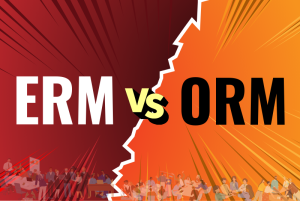Why measure?
Every business should ask itself how it is doing. The dynamics of the environment in which it operates demands it. Constant evaluation is a must; continuous benchmarking against the competition a necessity. But how should it be done? A lot of it has to do with corporate performance, which is intertwined with measuring the viability of the business. Measuring corporate performance quintessentially means determining how to carry on managing the business, and ensuring its sustainability.
Corporate performance and Enterprise Risk Management have a symbiotic relationship. Evaluating corporate performance aligns it with ERM and helps develop enterprise-wide strategy, besides monitoring the balance between daily business demands and long-term goals. What can be measured, can be managed and when it comes to measuring corporate performance, the proper tools and frameworks must be applied. Central to these efforts is access to the appropriate data, which needs to be clear, concise and current as such information is integral to decision-making which will move the organisation forward. Having up-to-the-minute data also allows the firm to manage its challenges and maximise its opportunities.
What should be measured?
Measuring corporate performance includes and involves the constant evaluation of the performance of Board and management. This includes how they are doing things, and the identification of shortfalls that may turn out to be barriers to the organisation’s efforts to achieve its goals. Measurement of this sort is never easy. It is further compounded by the dynamic environment of business. Special tools, methods and training must be applied when measuring, if the organisation is to achieve its objective of proactive, relevant and meaningful evaluation. Businesses are never stand-alones. They are interdependent upon other elements in the environment in which they operate. Any change here will inevitably have an impact on them.
Measuring therefore keeps corporations on their toes, and cultivates anticipation; anticipation brings with it an attitude of preparedness. To leverage effectively on anticipation, corporations need the right tools; and today, AI and new data processing tools, especially, are helping organisations take a different approach to resolving their issues and answering challenges. These new tools are bringing about new perspectives of how business should be done, and offering new ways of managing new elements that have arisen in the course of doing business. In an increasingly competitive global market, it is inadequate to just have knowledge of one’s own organisation. Knowing how other firms – competitors in particular – are coping, may be just as necessary.
Where to start?
As businesses move faster to keep pace with markets and environments, traditional performance measurement systems will be inadequate. Systems therefore have to be designed (or redesigned) to provide support for overcoming real or anticipated obstacles to achieving the organisation’s objectives. Such systems have to be customised; there is no one-size-fits-all solution. But two basic elements should be present: the appropriate expertise and appropriate channels of communication. The right expertise will enable the organisation to sort through a myriad of data to find what works and what doesn’t, and the right channels will bring useful data where it is needed most, at the material time.
Top management should always have access to current information on organisational activities like operations, market share, inventory and finance. Up-to-date details on revenue and expenditure will also be useful as they will indicate whether or not the organisation is keeping to its budget strategy. Measurement systems should allow top managers to intervene and make changes or corrections if things are not going according to plan; they should not just indicate performance but be capable of correcting imbalances and realigning the organisation when shortfalls have been identified, i.e., they should be strategic and utilitarian.
Who is responsible?
Out of necessity, measurement has to be a team effort. It applies across the organisation; thus, everyone should have a say. But expediency often dictates otherwise, and not everyone can give input when the need for a bespoke system arises. As far as possible, input should be sought from every level of the organisation so that an accurate picture of the firm’s health can be put together. Firms today are rarely one-man shows. The company must leverage on its channels of communication, and apply its expertise to determine what kind of feedback is important, what input works, and what data should be discussed or analysed to derive the most relevant information.
It is worth noting that while new methodologies need to be developed to cope with measuring the corporate performance of firms that now operate in environments that may bear little resemblance to the ones in which they were originally established, traditional measures should not be completely ignored. Nor should the teams setting up the measurement systems go overboard when it comes to adopting the measures. There are occasions when firms try to apply too many measures in their efforts to do things right – resulting in duplication of activity, loss of time and uneven allocation of resources that could have been better deployed.
Realising the results
Because performance measurement is an ongoing activity, the results may not be immediately obvious, which may give rise to doubt as to its effectiveness. It is a sad fact that post-incident reports often detail the event but fail to identify the exact elements that led to the failure, or link it to weaknesses in strategy or planning that could help the company avoid the same mistakes in future. Projects often run over budget, yet no one is able to put a finger on how to manage this problem, or what the contingency plans should look like.
Will measuring corporate performance improve a company’s bottom line? It will, provided the organisation understands its objectives, and management is proactive and sincere in implementing it. At the very least, measuring corporate performance will show the gaps between corporate strategy and the execution of that strategy, and take the edge off potentially unpleasant surprises.





























